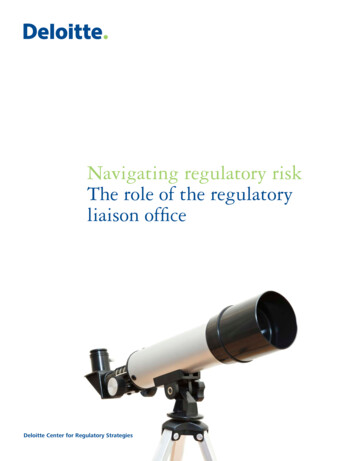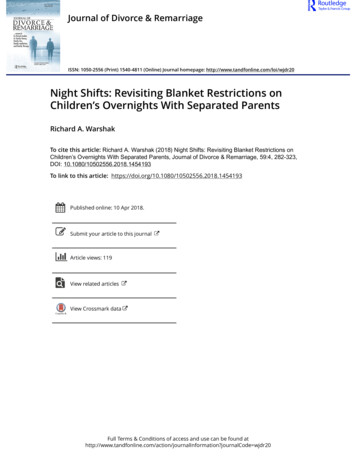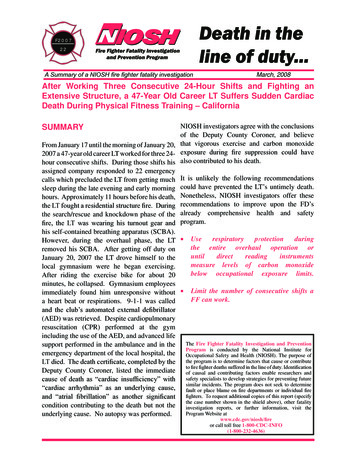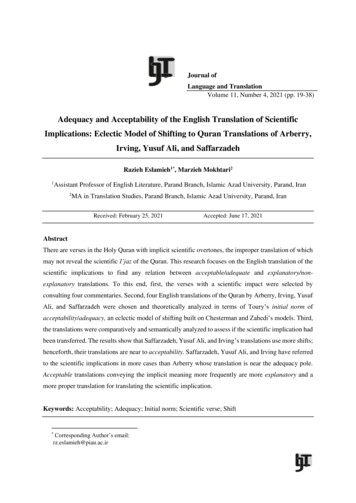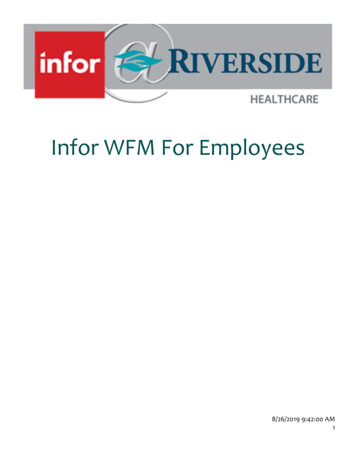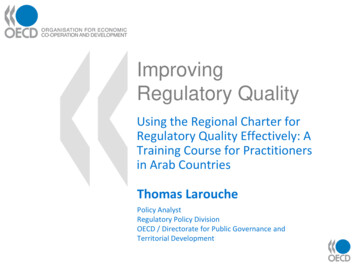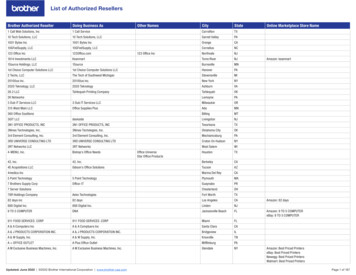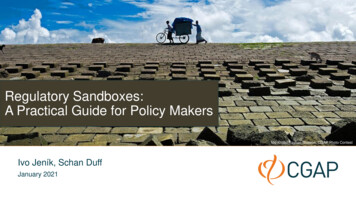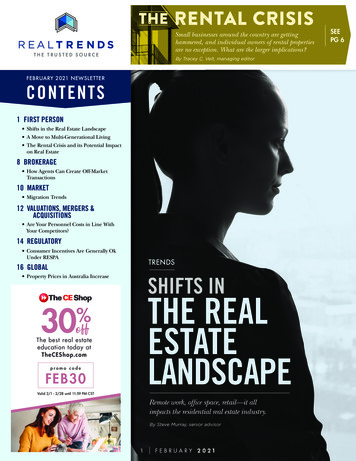
Transcription
THERENTAL CRISISSmall businesses around the country are gettinghammered, and individual owners of rental propertiesare no exception. What are the larger implications?By Tracey C. Velt, managing editorFEBRUARY 2021 NEWSLETTERCONTENTS1 FIRST PERSON Shifts in the Real Estate Landscape A Move to Multi-Generational Living The Rental Crisis and its Potential Impacton Real Estate8 BROKERAGE How Agents Can Create Off-MarketTransactions10 MARKET Migration Trends12 VALUATIONS, MERGERS &ACQUISITIONS Are Your Personnel Costs in Line WithYour Competitors?14 REGULATORY Consumer Incentives Are Generally OkUnder RESPATRENDS16 GLOBALSHIFTS IN Property Prices in Australia IncreaseTHE REALESTATELANDSCAPERemote work, office space, retail—it allimpacts the residential real estate industry.By Steve Murray, senior advisor1F E B R U A R Y 2 0 21SEEPG 6
FIRST PERSONThe pandemic brought about change at lightning speed. I rounded upjust a few of the studies that show some of the more significant changethat will impact real estate: Remote Work. A survey of more than 300 national employers by advisoryfirm Willis owers Watson said that 30% of their employees will beworking from home full-time in three years—up from 5% three yearsago. A New York University study of 3.4 million workers found thatat-home workers reported working an average of 26 extra hours amonth. Global Workplace Analytics, in a survey of 1,388 people workingfrom home, found that 80% said they would like to work from homethree days a week or more, up from 27% before the pandemic.HW Media, LLC433 East Las Colinas Blvd, Suite 830Irving, TX, 75039469-893-1480Web: realtrends.com Accelerated Digitization. Peter Grant of The Wall Street Journal commented,“As retailers learn to operate without stores, business travelers withoutairplanes and workers without offices, much of what started out as atemporary expedient is likely to become permanent. In many ways,digitization is simply the next chapter of a process under way for acentury: The dematerialization of the economy. As agriculture gave wayto manufacturing and then services, the share of economic value derivedfrom tangible material and muscle shrunk while the share derived frominformation and brains grew. Solar and wind power require no pipelinesor tankers. Carvana has established that people will buy cars virtually.”“As retailers learn tooperate without stores,business travelerswithout airplanes andworkers without offices,much of what startedout as a temporaryexpedient is likely tobecome permanent.”CEO:Clayton Collins - ccollins@housingwire.comManaging Editor:Tracey Velt - tvelt@realtrends.comCopyright 2021 by REAL Trends. All rightsreserved. Material in this publication maynot be electronically stored or reproducedin any form without written permission.Violators will be punished by a fine of up to 100,000 per offense.– Peter GrantThe Wall StreetJournal2REAL TRENDS
R E A LT R E N D S E T T E R s p o t l i g h tKeith beatty & Drew Pittman#52 on real trendstop 250 teams 1.5 Billion forcareer salesClosed over 6,500transactionsWe started with Boomtown in 2009and at that point we had 8 agents onthe team. Since then, we have grownto 25 agents (which is about where wehave been for 5 years). The Boomtownplatform has not only grown ourbusiness but also has helped retainquality agents.The business you’ve always wanted is waiting, and it’s built on BoomTown.Get started at BoomTownROI.com
FIRST PERSON Virtual Relationships. Joel Mokyr, an economic historian atNorthwestern University said, “One of the most importantand least appreciated roles is the great fake. It enablesincreasingly lifelike representations of some kind ofreality through analog or digital mimicry, referred to asvirtualization. One example is that the use of tools likeZoom seeks to recreate in virtual form the physicalrelations between bosses, employees and customers.However, Mokyr adds that “diminishing returns workhere as well. We can mimic reality, but we are not digitalcreatures ourselves, and our evolutionary backgroundwill continue to demand physical experiences.”Interestingly, many consumer brand companies also thinksome permanent changes have occurred and are betting onsignificant shifts in consumer purchases. Conagra Brandsand Kraft Heinz, for example, are buying and upgradingequipment to make more at-home meals. Kimberly Clark isconverting a plant from making tissue products from officeuse to home use lines. Proctor and Gamble is doing the same.WHAT DOES THIS MEAN FOR THE REAL ESTATE INDUSTRY?You’ve heard all of this before, but it bears repeating. Themove to expanded remote working is permanent for asignificant share of the office-based orkforce. This willcause a shift in where people can live regardless of where theywork. This shift will cause more activity for housing sales insuburban, ex-urban and rural markets and potentially lessactivity in urban core areas.A SHIFT AWAY FROM AN OFFICE-BASED CULTUREFor brokerage firms, it should mean a shift away from officbased cultures to more digitally interactive relationships. Mostbrokerage firms, Realto associations, coaches, and educatorshave learned that they can reach far more real estateprofessionals, far more frequently, and with rich content with amixture of online interaction and in-person events.The big challenge is how brokerage leaders can maintain,build or rebuild their cultures—moving from an officebased culture to a remote-based culture. Brokerage firmsthat built their businesses on in-person interactions andrelationships will need to adapt to a new environment.TECHNOLOGY VITAL TO BROKERAGE FUNCTIONSThis is a no-brainer and was happening even before thepandemic. Technology will become vital to the functionsof a brokerage firm. How agents interact with theircustomers, from CRM and virtual tours to onlinetransaction processing, will all have to be enhancedfor a brokerage to stay competitive and relevant. It alsomeans using technology and information to recruit anddevelop agents and staff more effectively.As Mokyr said, we are physical creatures, not digital, andin-person interaction will remain an integral part of how abusiness works. In residential brokerage, this will continueto be true more than in other fieldsDon’t kid yourself into thinking that it will go back to the wayit was 10 to 20 years ago. Most agents and teams abandonedoffices years ago when they found they could remotelywork from their homes or the local coffee shop. Whilemost home buyers won’t purchase without physically beingin the homes they may want to buy, the numbers who willpurchase remotely is going to grow to an unprecedentedlevel. The pandemic accelerated changes that were alreadyhappening in the real estate industry. The idea of buying ahome seen only through a virtual tour, while not mainstream,was accepted by many out-of-state or global homebuyers.For brokers, flexibility and innovation with an eye onconnective technologies and a healthy mix of in-personinteraction should set you up for success in the coming year.Steve Murray is a partner in REAL Trends Consulting, a brokerage consulting, M&A and valuation service. He is also a senior adviser forHWMedia, the owner of REAL Trends content, rankings and more.Flexibility and innovation with an eye on connective technologiesand a healthy mix of in-person interaction should set you up forsuccess in the coming year.4REAL TRENDS
FIRST PERSONTRENDINGA MOVE TO MULTIGENERATIONAL LIVINGThe pandemic has seen a shift from living in nursing homesto living with family. Builders are jumping on that trend.More builders are adding floor plans to new homes that provide formulti-generational living arrangements. According to the CEOs ofLennar, Toll Brothers and others, they’ve seen an increase of homebuyers looking for models where they can accommodate olderparents. In addition, Accessory Dwelling Units (ADU)are spreading rapidly. These are adjacent, sometimespermanent, additional living quarters that can bebuilt to provide space for other family members.Accessory Dwelling Units (ADU) arespreading rapidly. These are adjacent,sometimes permanent, additional livingquarters that can be built to providespace for other family members.Underlying this trend is a decrease in thenumbers of older persons living in assistedliving and nursing home facilities.According to the National InvestmentCenter for Seniors Housing and Care,the occupancy rates have fallen 2.5%in each of the last two quarters, whereno decreases had been seen before.While much of this is due to thepandemic, some believe that living withone’s family will be preferred to livingin assisted living or nursing homes.According the National Association of Realtors ,nearly 25% of all houses bought in the lastnine months were priced above 500,000, upfrom only 14% in the prior year. Much of this isdriven by the scarcity of low-priced, entry-levelhomes in almost every market in the country.Once the pandemic eases and those at risk arevaccinated, we don’t see the trend away from nursing homesand assisted living facilities changing in the short term.5F E B R U A R Y 2 0 21By Steve Murray, senior advisor
FIRST PERSONTHERENTAL CRISISSmall businesses around the country are getting hammered, and individualowners of rental properties are no exception. What are the larger implications?By Tracey C. Velt, managing editorWhen the pandemic began and an eviction moratorium was put in place, the cause was admirable.Shutdowns and economic uncertainty required an empathichand when dealing with unemployed workers who also facedeviction. However, the unintended consequences can be dire,especially for individual rental property owners, which makeup about half of all rental units, according to the 2018 RentalHousing Finance Survey. I know in Florida, we’ve had a glutof investors, both from out of state and globally, buyingaffordable properties as investment properties, many of whomare investing their retirement funds in these properties.In this article, I’m mainly referring to single-family homes.When eviction moratoriums are lifted, I believe we’re goingto see evictions happening at record rates. According to theNational Multifamily Housing Council (NMHC), only 76.6%of U.S. apartment households had made a full or partialrent payment as of January 6, the lowest level since thebeginning of the coronavirus pandemic.This is down from 79.3% as of Aug. 6 and follows the stoppageof the additional 600 monthly insurance payments that wasbeing paid to unemployed individuals, according to theNational Association of Realtors .Individual rental property owners and corporate-ownedrentals will be forced to raise rents to even attempt torecoup their losses from the last year. After all, in somecases, these landlords have given away their product formore than a year, all while paying the brick-and-mortar costsof maintaining the properties and paying taxes. Oh, and didI mention, we have an affordable home crisis in our country?I don’t have a crystal ball, nor have I studied this issue with thetime it deserves. I’ve spoken to a number of real estate leaderswho believe this rental crisis will be impactful. How do youprovide affordable housing and make a living? Of course,the recently passed COVID-19 relief packageincluded 25 billion on rental assistanceand expanded unemployment insurance. According to a recent Zillowsurvey, “While the extra assistancehelps on a monthly basis, millions behind on their rent stillface an incredible challengeof catching up on payments thathave piled up before temporaryeviction moratoriums expire.”In addition, for the individualowners, selling may be the onlyfeasible option, and that may begood for the real estate market,which is desperate for inventory.However, if the landlords themselves haven’t been able to keepup the hard costs, you’re lookingat a surplus of foreclosures.I would love to hear youropinion of this. Please emailtvelt@realtrends.com withyour thoughts on this potentialcrisis and what you thinkshould be done.Tracey C. Velt is the managing editorof REAL Trends, now owned byHWMedia.Only 76.6% of U.S. apartment households hadmade a full or partial rent payment as of January 6, thelowest level since the beginning of the coronavirus pandemic.6REAL TRENDS
2AN 021NO DAUN TESCED!TEOYNKERKEAESPSPONSORED BY:June 27 - 30, 2021The BroadmoorColorado Springs, COREGISTER YOUR SPOUSE ORGUEST TODAY!Leadership, organizational health expert andkeynote speaker Patrick Lencioni headlinesthe 2021 GOE offering you and yourleadership team expert coaching that will keepyou competitive, build a strong culture andcreate a lasting, thriving brokerage.Seats are limited, register KINSPIREREGISTER!
BROKERAGEPUZZLE MAKERSHOW REAL ESTATE AGENTSCREATE OFF-MARKETTRANSACTIONSHow do you get transactions when there isn’t any inventory? Creative sales associates know how.By Larry Kendall, author of Ninja Selling2021looks to be a strong realestate market with risingprices and low interest rates. Rightnow, the only headwind seems to be ashortage of inventory in many markets.How do we close transactions whenthere isn’t enough inventory? The mostcreative sales associates are what I callPuzzle Makers. They create off-markettransactions.WHAT’S AN OFF-MARKETTRANSACTION?To clarify, an off-market transaction isNOT a listing that is being held off themarket. It is a transaction that does notexist in the normal marketplace.Off-market transactions consist of sellerswho want to sell but are not on themarket, and buyers who want to buy butare not actively looking. How do youfind these parties and match them upThat is the magic of the puzzle makers.One of the best puzzle makers in ouroffice creates about 12 off-markettransactions every year. I asked her toshare her secret sauce. Here’s what shesaid, “The key is knowing your people’sdreams. Knowing their pain and theirpleasure and then helping them getfrom the life they have to the life theydream about. This may require goingout and finding a home for them thatis not on the market. The key is thedepth of your relationship with them.”THREE GROUPS OF MAGICQUESTIONS“How does this work, specifically?”I asked. “How do you discovertheir pain, pleasure, and dreams?”She offered three groups of magicquestions.1. F.O.R.D. questions. Here are thequestions and some recent responsesduring the pandemic:One of the best puzzle makers in our office createsabout 12 off-market transactions every year.8REAL TRENDS
BROKERAGE Family. “How’s the family?”Response: “We are doing OK,although we are struggling withhome schooling. Our house isnot set up for a classroom.” Occupation. “How’s work?”Response: “Both of us are working from home right now. It’s achallenge not having a homeoffice—especially with the kids athome all day.” Recreation. “What are you doingfor fun?”Response: “Not much. We can’twatch live sports or go to restaurantsand church. About the only thing wecan do is walk, and we are not reallyin a very walkable neighborhood.” Dreams. “If you could wave a magicwand and have your home just theway you want it, tell me about that.”Response: “We would have a biggerhouse with two home offices and awork-out area. We would be in aneighbor-hood with open space anda walkable environment.”2. “With today’s low interest rates, haveyour thought about doing thissooner than later?”Response: “Yeah we have, but wedon’t want to put our home on themarket until we find our new home,and there’s not much to pick fromright now.”3. “If I can find you a home that fitwhat you are looking for, would youtake a look at it?”Response: Well, we really aren’t inthe market right now.”Puzzle Maker response: “Sure. Youdon’t need to buy but you always needto look. There’s no harm in looking.”Puzzle makersare masters at putting“chains of transactions”together.Response: “I guess when you put itthat way, we’ll take a look at it.”The Mechanics: How do you put anoff-market transaction together? Thereare a number of ways: They solve it. It’s amazing whathappens when buyers get the bug tomove and find a home they love.They suddenly find ways to make ithappen. They discover extra cash ora bridge loan/HELOC that doesn’trequire them to sell their house first.Or, they decide to keep their houseas an investment property. An experienced puzzle maker oftenalready has the potential buyer fortheir house in mind. Puzzle makersare masters at putting “chains oftransactions” together. Does your company offer a guaranteedsales plan? This is where your companyguarantees the sale of their currenthome. Many companies are developing these plans due to the marketplaceneed plus the competition from iBuyers. Enroll iBuyers to help sell theirexisting home. Don’t be afraid ofiBuyers. Use them as a resource tohelp your clients. Be proactive.Take control of the situation andorchestrate the iBuyer offers.Here’s the bottom line: We get paid tohelp people go from the lives they haveto the lives they dream about. Thecreative puzzle makers are masters ofhelping people make it happen.We get paid to help people go from the lives they have to the lives they dream about.The creative puzzle makers are masters of helping people make it happen.9F E B R U A R Y 2 0 21
MARKET WATCHTRENDING2020MIGRATIONTRENDSYou’ve heard the news about people fleeingthe cities for more rural areas. It’s biggerthan that—they are fleeing the states.By Tracey C. Velt, managing editorWhile the news has been full ofreports that people are fleeingthe big cities, that migration has beenhappening for years. The pandemic;however, appears to have acceleratedthose moves. Now that people can workremotely, finding a new place to liveoffers many more options than thoseclose to the office.Two moving companies: U-Haul andNorth American Van Lines recentlyreleased their migration reports. Bothindicate that Americans are leaving theNortheast and Midwest in favor of theSoutheast and Southwest.The COVID-19 pandemic has coincidedwith more do-it-yourself moversleaving densely populated U.S. areas,specifically New ork City and theSan Francisco Bay Area, according toa U-Haul special report analyzingmigration trends from 2020.U-Haul transaction data also revealsAmericans are moving again in growingnumbers, and have been since May.In addition to its annual growth statesand growth cities rankings and reports,U-Haul considered the potential influencthe virus had on self-movers, andlooked at regions where overwhelmingdemand for one-way U-Haul trucksmirrored consistent out-migration.“While some people were hesitant tomove during shelter-in-place mandates,those who moved were doing so out ofnecessity,” U-Haul President John “J.T.”Taylor said. “We have been open andavailable to help all along as an essentialservice provider. As 2020 went along,we saw that moreand more individuals and familiesrecognized they can move safely.”According to the 2020 Migration Reportfrom North American Van Lines,people are fleeing California for exasand Idaho. The top eight states forinbound moves are Idaho, Tennessee,South Carolina, North Carolina,Florida, Texas and Colorado.As for outbound migration, New Yorkled the way, followed by New Jersey,California, Maryland, Pennsylvania,Michigan, Illinois, Minnesota andOhio, according to North American.What trends are you seeing in your market?Email me at tvelt@realtrends.com with yourthoughts.U-HAUL AND NORTH AMERICAN VAN LINES recentlyreleased their migration reports. Both indicate that Americans are leaving theNortheast and Midwest in favor of the Southeast and Southwest.10REAL TRENDS
BROKERAGERANKINGSAGENTRANKINGSSUBMIT NOW!SUBMIT NOW!NOW OPEN!NOW OPEN!
VALUATIONS / MERGERS & ACQUISITIONSBROKERAGE BENCHMARKINGARE YOUR PERSONNEL COSTS INLINE WITH YOUR COMPETITORS?Payroll-related costs are a huge expense for brokerage leaders. Howhuge is huge? We took a look at recent data to find out the trends.By Scott Wright, partnerFor most businesses, personnel expenseslie atop the operating budget. Theresidential real estate brokerage industryis no exception. On average, payrollrelated expenses in our industry are agood 10 points higher than the nextmajor expense category (occupancy.)According to our benchmark studies,this isn’t likely to change any time soon.As measured by a percentage of grossmargin, personnel expenses account fornearly one-third of the average firm soperating expenditures. While theseexpenses fluctuate based on commissioor operating model, it’s still the largestexpense for most brokerage firmsPersonnel expenses accountfor nearly one-third of theaverage firm’s operatingexpenditures. While theseexpenses fluctuate basedon commission or operatingmodel, it’s still the largestexpense for mostbrokerage firms.12REAL TRENDS
VALUATIONS / MERGERS & ACQUISITIONSAs part of our consulting practice, REALTrends Consulting takes a close look atwhat our clients are spending in this area,and we rely on this benchmark to assess thefirm. If a firm materially exceeds the bencmark, it’s probably wise to examine howto better optimize its employee roster.2020 STRIKES AGAINIf we take a closer look at this benchmark data, there’s a deviation that wemust watch. In the five years preceding2020, you’ll notice a pretty tight windowin the low 30s. As more 2020 data comesin, we’re seeing personnel expensesnoticeably slide. While not dramaticallylower year over year, they are at a levelunseen in this industry’s history.What’s the impetus for 2020’s decline inpersonnel expenditures? The simpleanswer is the pandemic. The secondquarter of 2020 was a time of extremeuncertainty for business owners, andmany acted swiftly in reducing theiroverhead. Naturally, many brokeragesfocused on personnel, furloughingreceptionists and office employeesAs the second half of the year unfoldedand the market started opening upagain, many firms eased cost cuttingincluding bringing back furloughedpersonnel. The question that remains tobe answered is: Given all that’s playedout over the year, will brokerages goback to pre-pandemic levels ofpersonnel spending?A STRUCTURAL SHIFTDue to the universal acceptance ofvirtual business spawned by the pandemic, we believe a structural shift isunderway that will indeed create a newnormal in personnel spending. Thisnew normal is not due to people beingless important in running a successfulbusiness, rather it’ll be a reaction toless infrastructure strain as brokeragesrethink their physical footprint.Brokerage leaders have long beenworried that downstream and upstreamtechnological advancements in ourindustry would reduce the need forhuman capital. Yet, if you look at thefive years preceding 2020, spending onBased on what we’re seeingplay out with our own clients,as well as responses fromvarious surveys we’ve conducted,many brokerages fully plan toreduce their physical footprintsby either closing offices asleases expire or reducingtheir square footage.13F E B R U A R Y 2 0 21personnel costs held the line ratherwell. Despite all the tech hype,people have and will always be vital torunning a successful brokerage.At REAL Trends, we think thatpersonnel expenditures will bereactionary to what is likely going tobe a structural shift in how firms arespending on occupancy-relatedexpenses. Based on what we’re seeingplay out with our own clients, as well asresponses from various surveys we’veconducted, many brokerages fully planto reduce their physical footprints byeither closing offices as leases expiror reducing their square footage.Reducing physical infrastructure willnaturally reduce the need for varioushuman support roles. While I don’t thinkpersonnel spending will fall dramatically,I do believe that what unfolded last yearis a harbinger of things to come.Scott Wright is a partner with REAL TrendsConsulting. Reach him at 303-741-1000.
REGULATORYCOVID-19 RECOVERYCONSUMERINCENTIVES AREGENERALLY OKUNDER RESPASettlement service providers who gift consumers forusing its services is fine, but there are certain conditions.By Sue Johnson, strategic alliance consultantMay a real estate broker, lender, or other settlementservice provider give a gift, rebate, or discount to aconsumer for purchasing its services (or its affiliated se vices)under Section 8 of RESPA?“Generally, yes,” said the Consumer Financial ProtectionBureau (CFPB) in its RESPA Frequently Asked Questions(FAQs) published on October 7.The FAQs were released in the same CFPB blog post thatrescinded its controversial 2015 Marketing Services Agreement(MSA) Bulletin. As discussed, in the November and December2020 REAL Trends Newsletters, they also provided guidance forMSAs and for gifts and promotional activities.THE CFPB FAQS ON CONSUMER INCENTIVESThe CFPB’s new FAQs provide the following regardingconsumer incentives under RESPA:Q: Under the Real Estate Settlement and Procedures Act(RESPA) Section 8, may a lender or other settlementservice provider give a gift, refund or discount to aconsumer for using that lender or provider?A: Generally, yes.RESPA Section 8 does not prohibit a lender or other settlement service provider from giving a consumer a gift or anincentive (e.g., a discount, refund of fees, chance to win aprize, etc.) for doing business with that entity. However,RESPA Section 8 prohibits, for example, giving an incentiveto a consumer in exchange for the consumer referring otherbusiness to that lender or other settlement service provider.Other federal and state laws may also have restrictions thatapply and should consulted.The CFPB’s interpretation is consistent with guidance provided by the Department of Housing and Urban Development(HUD) when it was responsible for administering RESPA.EXAMPLES OF CONSUMER GIFTS, REBATES, OR DISCOUNTSWhile consumer incentives in the real estate industry cantake many forms, here are some examples of gifts, rebates,and discounts provided by real estate brokers and agentsthat could be allowable under RESPA given the rightcircumstances:THE CFPB FAQS MAKE CLEAR that one should alwayscheck with state laws and regulations when offering consumerincentives, even if they are allowed under Section 8 of RESPA.14REAL TRENDS
REGULATORYAS ALWAYS, consult with your attorney before proceedingwith a consumer incentive program. Closing gifts: A real estate broker or agent may give a 500gift certificate to the client as an expression of the broker s oragent’s appreciation for the client’s business without violatingRESPA. But, the gift certificate should not be an expressioof appreciation for referring other clients, even under anunspoken understanding. The basic rule of the IRS is that ifyou give someone a gift for business purposes, your businessexpense deduction is limited to 25 per person per year. Real estate commission rebates: Real estate agent orbroker commission rebates to borrowers would not violateSection 8 of RESPA as long as no part of the commissionrebate is tied to a referral of business. However, manystates forbid sharing fees with anyone who doesn’t hold areal estate license. If allowed under state law, the rebatemust be listed as a credit on the Closing Disclosure andthe name of the party giving the credit must be identified. Incentives to consumers who use the affiliated compan . Agift card, discount, free service, or payment of closing coststo a consumer who uses a real estate broker’s affiliatemortgage or title company is allowed under RESPA as longas the consumer is not required to use the affiliated se vice(although if an incentive becomes too great it could beviewed as a required use); the incentive is bona fid(meaning that its value is not made up by increasing costselsewhere in the transaction); and the affiliated se viceseparately is available at prevailing market prices. Discounts on a package of affiliated se vices: Since 1992,15RESPA regulations have said that the offering ofa package or combination of settlement services or theoffering of discounts or rebates to consumers for thepurchase of multiple settlement services does not constitutea required use, which is prohibited under RESPA affiliatedbusiness regulations. However, any package or discountmust be optional to the purchaser, the discount must be atrue discount below the prices that otherwise aregenerally available, and the discount must not be madeup by higher costs elsewhere in the settlement process.BEWARE OF STATE RESTRICTIONS!The CFPB FAQs make clear that one should always checkwith state laws and regulations when offering consumerincentives, even if they are allowed under Section 8 ofRESPA. As noted above, some states forbid sharing fees and/or providing gifts to anyone who doesn’t hold a real estatelicense, and many states that permit it require that anyrebates be disclosed to all parties in the transaction. Somestate regulators may totally prohibit consumer incentives ina particular industry. As always, consultwith your attorney before proceedingwith a consumer incentive program.Sue Johnson is the former executive director ofRESPRO, the Real Estate Services ProvidersCouncil Inc. She retired in 2015 and is now astrategic alliance consultant.F E B R U A R Y 2 0 21
GLOBALCOVID-19-PROOF REGIONSRESIDENTIAL PROPERTY PRICES INAUSTRALIA HAVE INCREASEDDespite lockdowns, some global real estate markets are doing well.Around the world, the economicfallout from the coronaviruspandemic and the lockdowns thatfollowed have a far-reaching impact onreal estate markets. Property prices insome areas are showing unexpectedresilience despite this disruption.In Australia, the largest portal—realestate.com.au—reports thatregional areas dominate the list ofareas with the largest price growth forthe four-month period to the end ofAugust 2020.“Western Australia has seen strongprice growth which reflects the factthat low interest rates, governmentstimulus, and the bounce back fromCOVID-19 have led to strong demandin the state, which is pushing priceshigher,” says the portal’s ExecutiveManager for Economic Researc
working from home full-time in three years—up from 5% three years ago. A New York University study of 3.4 million workers found that at-home workers reported working an average of 26 extra hours a month. Global Workplace Analytics, in a survey of 1,388 people working from home, found that 80% said they would like to work from home

